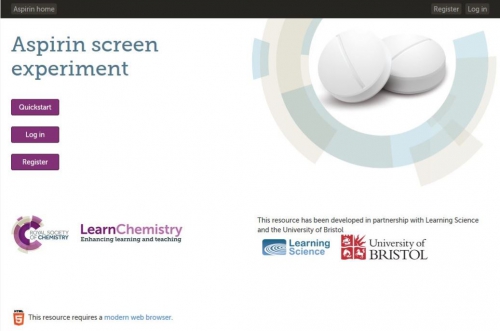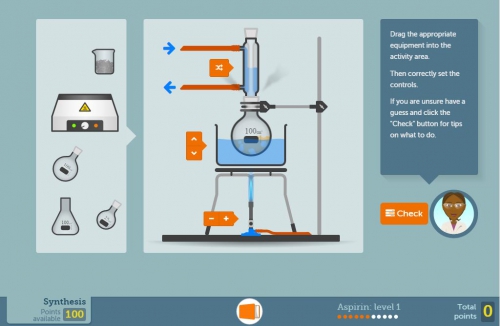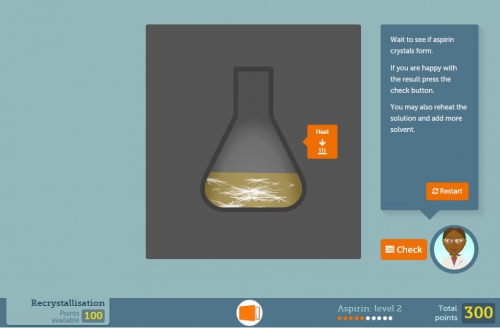The
aspirin screen experiment is a freely available digital resource. The interactive tool enables students to undertake an aspirin synthesis, perform recrystallisations, thin layer chromatography and modify experimental conditions to determine the effect on yield.

This interactive resource introduces students to the aspirin synthesis and coaches them through the steps needed to complete a class practical.
http://www.rsc.org/learn-chemistry/resource/res00001644/aspirin-screen-experiment
Many students often report that some practical classes can feel rushed with objective unclear. Teachers often report that if they remind students of practical work completed last week many will not remember the details. Feedback on our screen experiments to date suggests it does increases student’s familiarity with the procedure and therefore save precious class time.
The synthesis of aspirin is an example of an organic chemistry experiment which is a key requirement for key stage 5 (A-Level / BTEC) across all specifications. We have targeted this experiment as the first of a new kind of educational resource to support real life practical work.
The resource is divided into four levels, each of which are estimated to take a student approximately 30 minutes to complete either as homework or as an in-class activity.


Levels 1 and 2 are ideal pre-lab activities which introduce the experiment and can be repeated by the student anytime. This unique learning opportunity is designed to make it easier for the student to take part in the classroom practical.
Levels 3 and 4 are designed as ideal post-lab activities which allow students to investigate the effects of varying the conditions and reagents in order to optimise the reaction. It is based on real experimental data and is an excellent inquiry tool for students to make guided discoveries.
Built using HTML5 the resource requires no plug-ins or installations. You will need to ensure you are using Chrome, Firefox or Internet Explorer 10 browsers. The product also works on touch screen devices like Android tablets using a chrome browser and iPads.
Students will need to register and log in to the resource. This means that students can save their progress, score points and collect information on their own lab book as well as earn personal badges. These features are expected to increase the likelihood of the student wanting to repeat the activities to improve their skills.
The login user numbers can be shared with teachers so that the teacher can observe completed homework and review the lab books to identify areas requiring more explanation in class. At the end of each level there is a review section for students to reflect on their progress and draw some conclusions. We expect these reviews will be shown to teachers and discussed in more depth in class.
We are currently working on a new screen experiment on the topic of titrations to be released later in 2015. We will also be opening the new screen experiment section of the
experimentation hub on
Learn Chemistry shortly to reflect this and other available resource from around the web.
